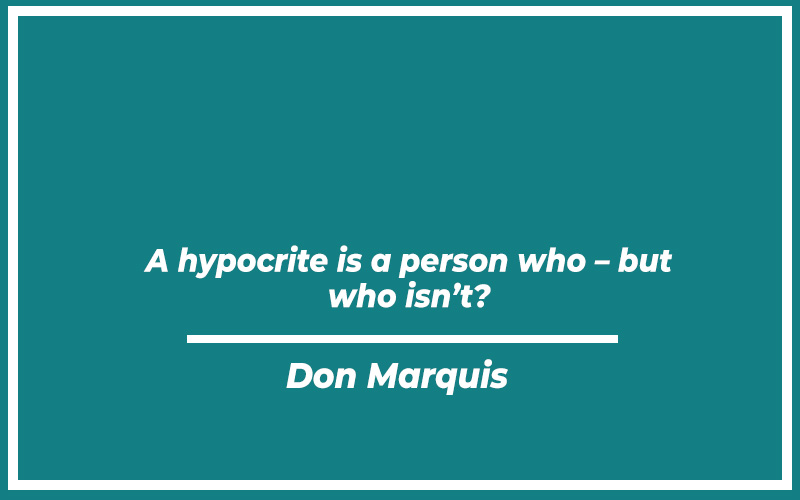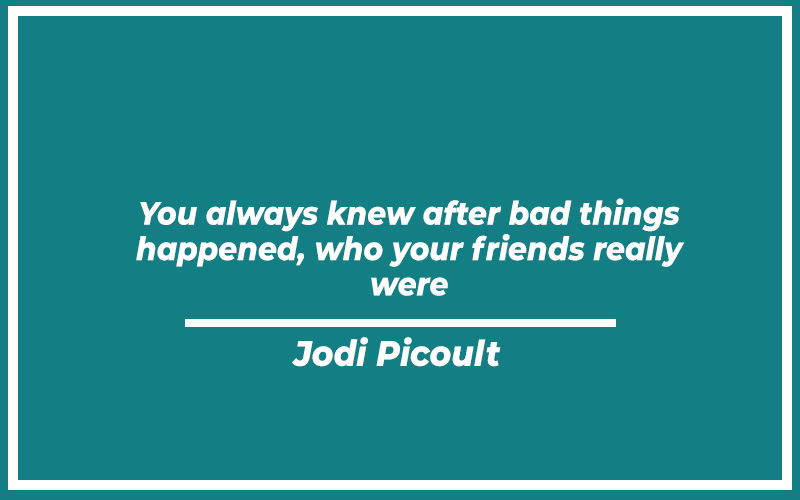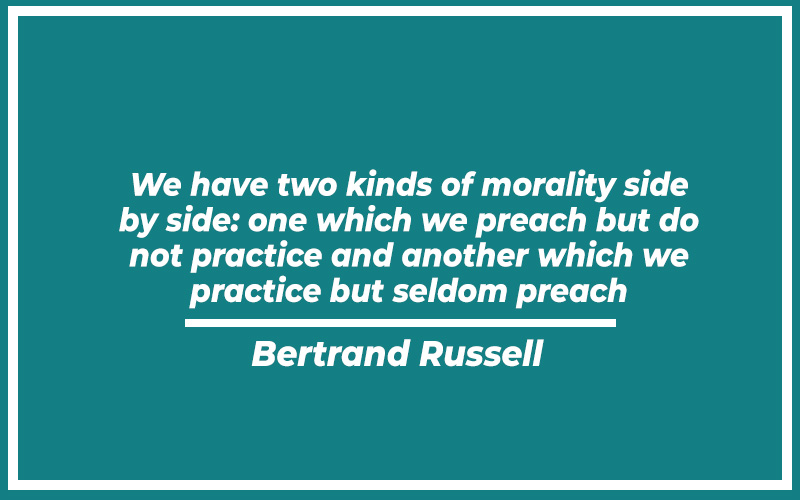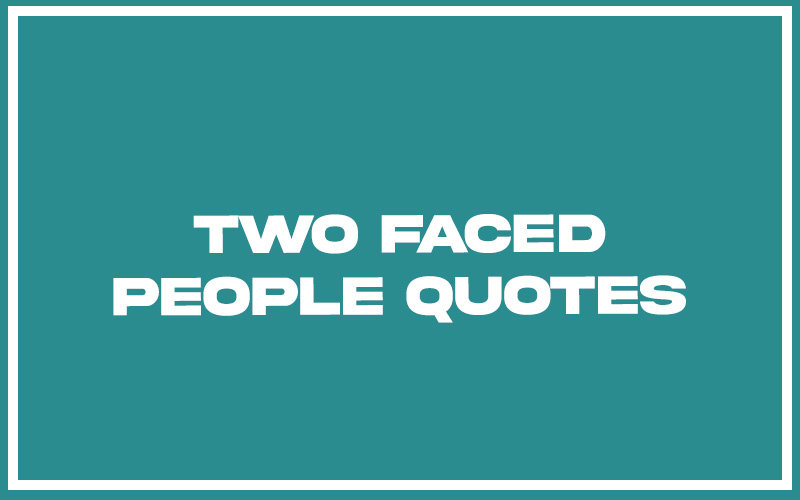Imagine a world where everyone was honest and upfront. No hidden agendas, just genuine interactions. Sounds pretty good, doesn’t it? That’s why quotes about two-faced people are so powerful.
They expose the hypocrisy and negativity of this behavior, reminding us why honesty is always the best policy.
Let’s explore some quotes about two-faced people and see why being genuine is the key to healthy relationships.
Two Faced People Quotes

“A hypocrite is a person who – but who isn’t?” – Don Marquis
Don Marquis touches on the universal nature of hypocrisy with a rhetorical question that invites self-reflection. His quote suggests that everyone may, at some point, display hypocrisy, thus calling for a degree of humility and understanding in our judgments of others.
This insight encourages us to be introspective about our own actions and more forgiving of the flaws in others, recognizing hypocrisy as a common human failing rather than a unique moral defect.
Also Read: Animal House Quotes (with Explanation)
“I’d rather deal with thick-faced people rather than wasting time with two-faced ones.” – Carlos Ruiz Zafón
Carlos Ruiz Zafón captures a common sentiment about sincerity in relationships. Preferring “thick-faced” people, or those who are unabashedly straightforward, over those who are deceitful, underscores the value of honesty even if it comes off as blunt.
This perspective champions authentic interactions over superficial or deceptive ones, suggesting that the discomfort of blunt honesty is preferable to the harm caused by duplicity.
“If you’re gonna be two-faced at least make one of them pretty.” – Marilyn Monroe
This Marilyn Monroe quote wittily addresses the concept of duplicity with a touch of humor. It suggests that if someone must adopt two personas, they should at least make one appealing. This underscores the idea that being two-faced is inherently unattractive and deceitful.
Monroe’s remark, delivered with her characteristic blend of sharp wit and charm, critiques the dishonesty in people while also poking fun at the vanity and superficiality that often accompanies such behavior.
“A true friend never gets in your way unless you happen to be going down.” – Arnold H. Glasow
Arnold H. Glasow highlights the essence of true friendship with this insightful observation. True friends support one another’s growth and success rather than obstructing it unless they are preventing a downfall.
This quote is particularly resonant in discussions about two-faced individuals who might appear supportive but actually hinder progress out of jealousy or self-interest. It serves as a reminder to cherish those who genuinely seek our well-being and caution against those who do not.
“Fake friends are like shadows: always near you at your brightest moments, but nowhere to be seen at your darkest hour.” – Habeeb Akande
Habeeb Akande draws a poignant analogy between fake friends and shadows, emphasizing the conditional nature of their presence. Like shadows that are visible only in the presence of light, fake friends are often around during times of success or happiness but disappear during challenges and low points.
This metaphor serves as a warning to recognize and appreciate those who stand by us consistently, not just when circumstances are favorable.
“The most dangerous among us come dressed as angels and we learn too late they are the devil in disguise.” – Carlos Wallace
Carlos Wallace’s quote warns of the deceptive nature of some individuals who present themselves as benevolent but harbor malicious intentions. The contrast between “angels” and “devils” underscores the shock and betrayal felt when true motives are revealed.
This quote serves as a cautionary tale to remain vigilant and discerning about the intentions of those around us, recognizing that appearances can be deceiving.
“How to make life peaceful and happy? The answer is simple and easy: Just delete all negative and destructive people from your life always and forever.” – Lord Robin
Lord Robin offers straightforward advice on cultivating a peaceful life by eliminating negative influences. The directive to “delete” such people suggests a proactive approach to personal well-being, emphasizing the importance of surrounding oneself with positivity.
This quote resonates in discussions about two-faced individuals, highlighting the benefits of distancing oneself from those who contribute to unhappiness or strife.
“We ought to see far enough into a hypocrite to see even his sincerity.” – Thomas Fuller
Thomas Fuller’s quote provides a nuanced view of hypocrisy, suggesting that even in deceit there can be elements of truth. This observation encourages a deeper understanding of people’s motivations, recognizing that even those who are dishonest may have moments of genuine sincerity.
Fuller’s perspective invites us to look beyond surface appearances and consider the complex nature of human behavior, which may include conflicting traits.
“When people are two-faced, the only thing you’ll know for sure is that you can’t trust either of them.” – Carlos Wallace
Carlos Wallace delivers a piercing truth about deceit, highlighting the inherent unreliability in two-faced individuals. His observation stresses that when someone juggles multiple facades, neither persona can be trusted, as both are rooted in deception.
This insight is crucial for personal relationships, suggesting vigilance and skepticism towards those who display contradictory behaviors, thereby safeguarding one’s emotional and psychological well-being.
“Always sleep with one eye open. Never take anything for granted. Your best friends might just be your enemies.” – Sara Shepard
Sara Shepard captures the essence of caution in relationships with this stark warning. Her advice to “always sleep with one eye open” metaphorically underscores the necessity of being alert and not complacently trusting others, even those closest to us.
This quote serves as a reminder that people’s intentions aren’t always apparent and that vigilance can prevent betrayal.
“I love fake people provided they are mannequins.” – Pushpa Rana
Pushpa Rana’s quote uses sharp wit to distinguish between harmless pretense and harmful deceit. By stating a preference for “fake people” only if they are inanimate mannequins, Rana humorously condemns the destructiveness of insincerity in human interactions.
This quote cleverly critiques those who adopt false personas, suggesting that such behavior is acceptable only where it can do no real emotional harm.
“Fear of something is at the root of hate for others, and hate within will eventually destroy the hater.” – George Washington Carver
George Washington Carver explores the destructive impact of harboring hate, tracing its origins to fear. His insight reveals that internalized negativity does more damage to the bearer than to its intended targets, serving as a cautionary note about the toxic effects of such emotions.
This perspective encourages self-reflection and promotes the cultivation of understanding and tolerance as antidotes to fear and hate.
“A friend who stands with you in pressure is more valuable than a hundred ones who stand with you in pleasure.” – Edward G. Bulwer-Lytton
Edward G. Bulwer-Lytton emphasizes the importance of steadfast support during challenging times as opposed to fair-weather friendships.
This quote champions the value of those rare individuals who provide genuine support when it’s most needed, contrasting them with those who are present only during easy times. It serves as a guideline for assessing the depth and sincerity of our relationships.

“You always knew after bad things happened, who your friends really were.” – Jodi Picoult
Jodi Picoult succinctly captures the revealing nature of adversity in showing true friendship. Her observation suggests that challenges and difficulties are not just obstacles but also tests that unveil the true loyalty and support of those around us.
This quote encourages a deeper appreciation for those who remain steadfast in tough times, recognizing their importance in our lives.
“The best defence is to keep off the radar of negative people.” – Steven Redhead
Steven Redhead offers practical advice on dealing with negativity by advocating for a strategy of avoidance. His perspective on defense against the detrimental effects of negative individuals emphasizes the benefits of distancing oneself from toxic influences.
This proactive approach to mental and emotional health advocates for maintaining personal peace by carefully choosing one’s social circle.
“Everyone has two faces but often we see only one side of them so never judge anyone by there looks because the truth might surprise you!” – Aaron Chan
Aaron Chan advises against quick judgments based on superficial appearances. His quote is a reminder that people often have multifaceted personalities and hidden depths that may not be immediately apparent.
This insight encourages a more thoughtful and open-minded approach to interpersonal relationships, urging us to look beyond the surface to understand the complexities of human nature.
“Stop entertaining two-faced people. You know the ones who have split personalities and untrustworthy habits.” – Amaka Imani Nkosazana
Amaka Imani Nkosazana urges us to disengage from relationships with people who display duplicity and unreliability.
This quote emphasizes the importance of surrounding ourselves with individuals who are genuine and trustworthy, advocating for a proactive stance in managing our social circles to enhance our emotional well-being and peace of mind.
“Remember the friends who stuck with you when they thought you had nothing.” – Joyce Rachelle
Joyce Rachelle highlights the importance of recognizing and valuing the loyalty of friends who stand by us during our lowest points.
This quote serves as a reminder of the true test of friendship—unconditional support and presence in times of need, devoid of any material or social gain. It encourages gratitude towards and preservation of relationships with those who have proven their loyalty.
“The real friends are out there on your own, on your lost and on your special days. If they aren’t there, take it like they aren’t your friends, find other friends.” – Deyth Banger
Deyth Banger offers a pragmatic view on friendship, suggesting that true friends are those who are present during both our everyday moments and our pivotal life events.
This quote encourages us to evaluate the consistency of our friends’ support and presence, and to seek out relationships that are reliable and heartfelt, emphasizing the importance of reciprocal commitment in friendships.
“Candor is a compliment; it implies equality. It’s how true friends talk.” – Peggy Noonan
Peggy Noonan highlights the value of honesty and openness in relationships. She posits that true candor is not just about being blunt, but a sign of respect and an indicator of genuine friendship.
This quote serves as a reminder that real connections are built on a foundation of trust and mutual respect, where open communication is celebrated and valued as a way of showing care and equality.
“Friends ask you questions; enemies question you.” – Criss Jami
Criss Jami draws a fine line between the inquisitiveness of friends and the scrutiny of enemies. This quote sheds light on the difference in intent behind the questions we face from those around us.
It suggests that while friends seek to understand us better out of affection and interest, enemies probe to uncover weaknesses or to incite insecurity. Understanding this distinction can help us navigate our relationships more wisely.
“Hypocrisy has its own elegant symmetry.” – Julie Metz
Julie Metz offers a nuanced view of hypocrisy, describing it as possessing an “elegant symmetry.” This metaphor highlights the balanced, albeit deceptive, nature of hypocrisy where individuals present a facade that mirrors societal expectations while concealing their true selves.
Metz’s observation prompts a deeper consideration of the complexities of social interactions and the often contradictory demands placed upon individuals by their communities.
“If I were two-faced, would I be wearing this one?” – Abraham Lincoln
Abraham Lincoln famously used humor to address accusations of being two-faced. His rhetorical question challenges the notion by suggesting that if he had the luxury of choosing a facade, he would opt for a more favorable one.
This witty retort not only defuses criticism but also illustrates Lincoln’s adeptness at turning an accusation into an opportunity for lighthearted self-reflection, encouraging us to handle criticism with humor and grace.
“Go put your creed into your deed, Nor speak with double tongue.” – Ralph Waldo Emerson
Ralph Waldo Emerson advocates for integrity and authenticity in this powerful directive. He urges individuals to align their actions with their beliefs, rather than speaking with a “double tongue.”
This quote serves as a call to live out one’s values consistently and honestly, emphasizing the importance of congruence between words and actions in establishing a life of principle and trust.
“How nice of you to introduce me to your second face after I decided to trust you.” – Carlos Wallace
Carlos Wallace captures the betrayal felt when someone reveals their dishonesty after gaining trust. His statement addresses the emotional impact of discovering duplicity in someone we believed in.
This quote serves as a cautionary tale about the risks of trust and the importance of vigilance in discerning the true character of those around us.
“Dealing with backstabbers, there was one thing I learned. They’re only powerful when you got your back turned.” – Eminem
Eminem reflects on his experiences with deceitful individuals, emphasizing that their power is contingent on deceit and the unawareness of their targets. His observation highlights the importance of awareness and self-protection against those who might exploit trust.
Eminem’s quote encourages resilience and vigilance, advocating for a stance where one is less vulnerable to betrayal by keeping potential deceivers within sight.

“We have two kinds of morality side by side: one which we preach but do not practice and another which we practice but seldom preach.” – Bertrand Russell
Bertrand Russell critiques the common human discrepancy between espoused values and actual behavior. His insight into the dual nature of morality challenges us to reflect on the authenticity of our own principles.
This quote encourages a reconciliation of these two aspects of morality, aiming for a more integrated and genuine expression of our ethical beliefs in daily life.
Also Read: Lord Faquaad Quotes (with Explanation)
Final Thoughts
While negativity and gossip might seem easy in the moment, building trust and fostering real friendships is far more rewarding.
Now, what are you going to do the next time you encounter someone who is two-faced? Remember these quotes, and choose to be the kind of person you want to have in your life: straightforward, honest, and true.

